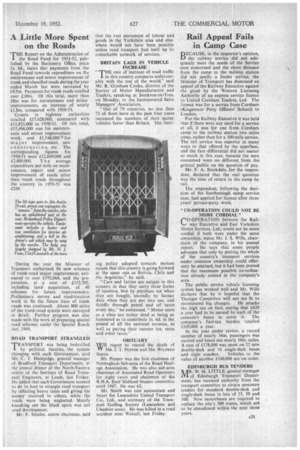Rail Appeal Fails in Camp Case
Page 33

If you've noticed an error in this article please click here to report it so we can fix it.
BECAUSE, in the inspector's opinion, the railway service did not adequately meet the needs of the Service men concerned and the short distance from the camp to the railway station did net justify a feeder service, the Minister of Transport has dismissed an appeal of the Railway Executive against the grant by the Western Licensing Authority of an express service licence toUnited Corsham Traders, Ltd. The licence was for a service from Corsham (Kingsmoor Petty Officers' School) to I.ondon.
For the Railway Executive it was held that if there were any need for a service at all, it was for one from Corsham camp to the railway station two miles away, rather than for a 100-mile service. The rail service was superior in many ways to that offered by the appellant, and the fare differential did not matter so much in this case, because the men concerned were no different from the general public on the question of pay.
Mr. F. A. Stockdale, for the respondent, declared that the real question was the time of return to the camp by rail.
The respondent, following the decision of the Scarborough camp service case, had applied for licence after three years' private-party work.
"CO-OPERATION COULD NOT BE MORE CORDIAL'
CO-OPERATION between the Railway Executive and East Yorkshire Motor Services, Ltd., could not be more cordial if both were under the same ownership, states Mr. J. S. Wills, chairmain of the company, in his annual report. He says that some people advocate that only by putting the whole of the country's transport services under common ownership could efficiency be attained, but it had been proved that the maximum possible co-ordination already existed in the company's area.
The public service vehicle licensing system has worked well and Mr. Wills declares that he is hopeful that the Thesiger Committee will not see fit to recommend big changes. He attacks the high tax on fuel, stating that £420 a year had to be earned by each of the concern's buses to cover it. The company's fuel-tax burden totalled £105,000 a year.
In the year under review, a record number of nearly 34m. passengers was carried and buses ran nearly 10m. miles. A sum of £178,000 was spent on 22 new double-deck and 16 single-deck buses
and eight coaches. Vehicles to the value of another £100,000 are on order.
EDINBURGH BUS TENDERS
ik AR. W. M. LITTLE, general manager IVI of Edinburgh Transport Department, has received authority from the transport committee to obtain specimen tenders for standard. double-deck and single-deck buses in lots of 25, 50 and IOU. New motorbuses are required to replace the city's 300 trams, which are to be abandoned within the next three years.




















































































